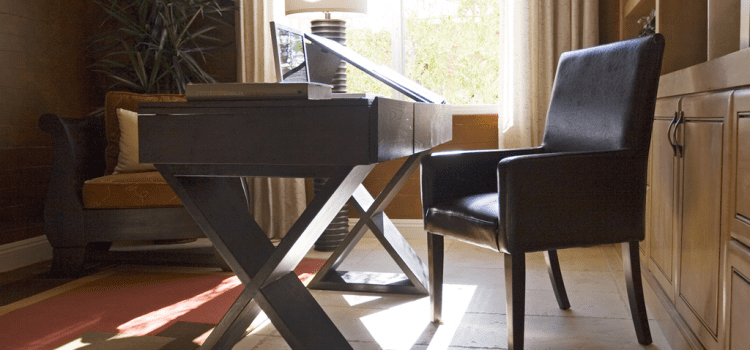Lots of freelancers work from home, often finding it to be cheaper and more convenient than finding workspace elsewhere. Working from home means you don’t need to take on the cost of a separate location, whilst making it simpler to work the hours that suit you in an environment you have control over.
But is it as great as it sounds? It can be, but it all depends on what sort of room your freelancing needs. We share our favourite tips on how to set up your home-working space, and answer some of your most frequently asked questions – including what it means for your tax bill.
Can anyone work from home?
Plenty of people work from home, although you may need to make particular arrangements depending on the nature of your freelance work.
You won’t normally have much to worry about if your work is online based (beyond a decent internet connection). If you’re making changes to the property, having clients over, or running a larger operation, you might need to ask permission – such as from your landlord or mortgage lender.
Do I need insurance if I freelance from home?
Most tenants and homeowners have insurance to cover the property and/or contents, so it’s worth checking that working from home won’t affect your existing cover.
You might also need additional insurance policies depending on the freelance services you offer.
Can freelancers claim expenses for working from home?
Freelancers pay tax based on the profit they make rather than the total amount of income, so claiming tax relief on your business expenses is very important! Most business costs are ‘allowable’ as long as they relate directly to your work.
If you work from home, then you may be able to claim a proportion of your household bills as a freelancing expense too.
What are the pros and cons of freelancing from home?
These might be different for everyone, depending on what sort of work you do and who you are as a person. Some people prefer the company of others despite working alone, while others crave silence, for example.
- Cost: Working from home can be cheaper for freelancers. It’s a space you’re (probably) already paying to occupy, and you’re less likely to spend money on lunches, coffees, and transport than you might if you worked away from home. You might even escape those pesky business rates.
- Time: Having your office just across the landing really does cut that commute! This can make it too easy to be in work though, which brings us to…
- Work/life balance: When work and life happen in the same place, you may need to put measures in place so you can focus when needed, and switch off when it’s time.
- Expenses: You may be able to claim tax relief on working from home expenses which relate to your freelancing
- Distractions: Some freelancers find that setting a strict working schedule helps if this is realistic for your circumstances.
- Loneliness: Working without any human interaction can affect your mental health, so you might find you need to change things up from time-to-time
- Backups and security: Communications, client data, the work you produce – it’s all your responsibility to keep it safe! Make sure you’re the only one who can access it, and that everything is backed up.
How do I set up a home-working space?
Pinterest and Instagram’s vision of working from home might not match the reality of your freelancing budget, but a good workspace does matter. If you want to optimise your productivity and mental wellbeing, it might be time to give your office or workshop some love.
Workplace injuries are often a result of poorly set up workstations which, over time, lead to health problems including:
- Musculoskeletal disorders
- Muscle pain and wastage
- Inflamed joints
- Repetitive strain
- Eye strain, irritation, or blurred vision
- Chronic headaches or migraines
If you work at a bench, is it tall enough for you to use without hunching over? Likewise, if you need a desk, is it set to the correct height, with space for everything you need, and a good chair? Natural daylight and fresh air can also make a huge difference in your mood!
Lighting, layout, acoustics, and equipment will make an enormous difference.
Storage is also an important consideration so if you rely on paper, you might consider saving some space (and printing costs) with cloud-based work.
How to stay focused and beat distractions when freelancing from home
Distractions and interruptions can be a major struggle for freelancers working from home. Your kids might wander in, the sofa is right there, and there’s always at least one person who simply doesn’t understand that you’re working from home.
We share some of our favourite (tried and tested) tips for beating freelance distractions.
Designate your working space
Wherever possible, try to assign space that’s just for business use. Whether it’s your spare room or your garden shed, a separate workspace can make a difference to your mindset and concentration.
If that’s not practical, consider marking out your work territory in another way, for example:
- Avoiding your normal down-time lounging locations on the bed or the sofa if you’re laptop based
- Storing kit out the way after appointments if clients visit your home for beauty treatments or physical therapy
Just remember to discuss your arrangements with anyone you share your home with first!
Tackle the doom-scrolling
Knowledge might be power, but unlimited access to online information is sometimes difficult to resist. Everyone procrastinates with a spot of social media scrolling or online shopping, but it can be easy to get carried away.
There are lots of tools and apps which can help, from blocking certain sites at set points in the day, to displaying a big timer which starts when you open certain apps.
You might even set up a separate browser profile just for freelancing (double bonus points for not being followed around the internet by adverts relating to your work).
Handle family distractions
The people you live with can be very distracting, especially if you’re part of a busy household. If you don’t have the option of simply shutting the door, you could try noise-cancelling headphones, or gently remind everyone (and yourself) that you’re trying to earn a living.
Failing that, you might simply arrange your working hours around what’s happening at home. You are your own boss, after all.
Beat procrastination
Before you start setting increasingly strict rules for yourself, do you procrastinate because you’re bored or overwhelmed (or both)? It usually helps to break tasks down into smaller, more manageable chunks.
That way you can reward yourself with micro-breaks, rather than cleaning the bathroom to avoid a five-minute phone call.
Create to-do lists
Yep – this old chestnut! Just like a business plan helps you focus on your long-term goals, a to-do list will help you stay on track for the short-term stuff. Consider using a daily and weekly (and maybe even monthly) list and again, break everything down into manageable tasks.
How can I switch off when I work from home?
Separating work and home can be difficult if they both take place under the same roof. If you’re struggling to down tools (or get started) help is at hand.
Separate phone lines
Creating a separate phone line for your business allows you to switch it off out-of-hours. There’s also less risk of someone answering your work calls (and forgetting to pass on a message).
Decide what time you’re going to work
Self-employed freelancing normally means you can set your own hours – particularly if you work from home. Be flexible when you need to, but if you’re struggling to get motivated or switch off you might find it useful to set working hours. And stick to them. You can still take breaks to do other things. But stick to them.
Get ready for work (and rest)
Tempting though it may be to work in your pyjamas, be honest with yourself. Does this help you get into work mode and feel professional? Getting physically ready helps you prepare mentally, just as changing back into your chill-out clothes will help you switch-off when you’re done.
Make rules for your workspace
Freelancing is still work and you still need to hit deadlines, communicate effectively with other people, work to a satisfactory standard, and get enough done to earn a living. It’s still work.
Your health and wellbeing, work schedule, and productivity are now down to you. Boss-you needs to make some working-from-home rules. Be firm with yourself!
Work when you should be, but remember that breaks are essential for your physical and mental health.
Have a winding down routine
A routine makes the winding-down process into a subconscious habit, easing you into the right frame of mind so you can shut off when it’s time. It will look different for everyone, but it’s often helpful to clear the decks so everything’s ready to go again when you’re ready.
Create a separate work and personal login
If you use a computer or device for freelancing, separate user accounts for your work and personal lives minimises overlap. It might help you focus just as much as making it easier to disengage.
Freelance alternatives to working from home
Some freelancers love working from home and have no problem getting their work done, but if you find some days tricky (or don’t fancy meeting clients at your dining table) then you may need an alternative.
Co-working spaces
Co-working spaces are available across the UK and can normally be hired on a very flexible basis – even if you just need a meeting room for an hour.
Libraries
Libraries are free, have internet access, scanners, printers, and other people if you’re feeling a bit lonely. Just keep in mind that you might not be popular if you’re making phone calls all day. It’s also worth checking if they have dedicated silent or study areas (in case Toddler’s Storytime isn’t the vibe you were after!).
Coffee shops and cafes
Most coffees shops and cafes are happy to let you sit there and work, providing you buy relatively frequent drinks and don’t drag out your own packed lunch. You may even help a quiet place look busier!
Desk surfing or swapping
If you have an obliging friend (or two?) with space, are they happy to share or let you work there alone from time-to-time? Worth an ask!
Visit our Freelancer Resource Hub for more guides and articles.







